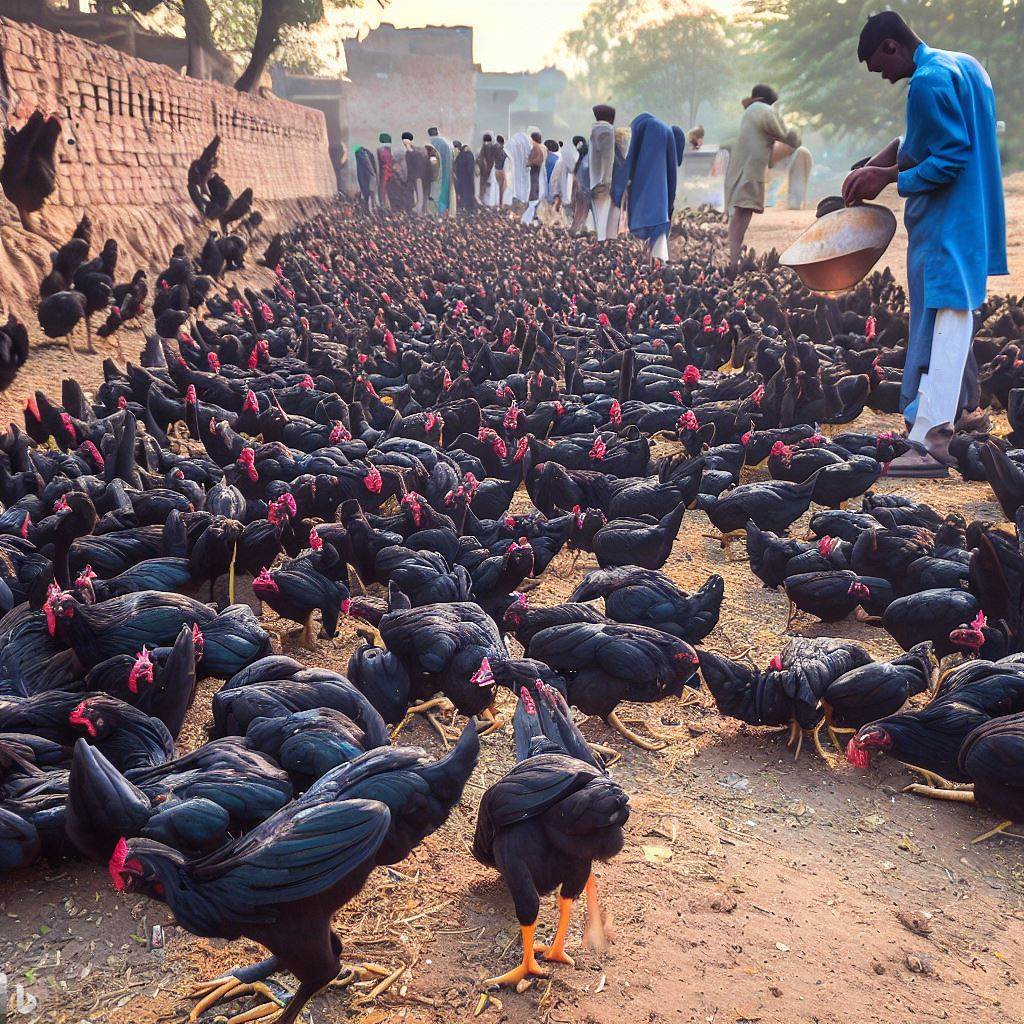Introduction:
Kadaknath chicken, also known as the “Black Meat Chicken,” is a breed of chicken that is native to India. This chicken breed is known for its black flesh and meat, considered a delicacy in many parts of the world. This chicken is also known for its high nutritional value, making it a popular choice among health-conscious consumers. Kadaknath chicken farming has become an increasingly popular business venture due to the high demand for this unique breed of chicken. This blog will discuss Kadaknath chicken farming in detail, including breeding, feeding, housing, management, and profitability.
Breeding:
Breeding Kadaknath chickens involves selecting the best-quality birds and mating them to produce offspring with desirable traits. Here are some essential factors to consider during the breeding process:
- Selecting the Best-Quality Birds: It is crucial to select only the best-quality birds for breeding, based on their physical attributes, health, and productivity. This selection process will ensure that the offspring inherit desirable traits, such as high meat yield and good egg production.
- Maintaining Optimal Male-to-Female Ratio: Maintaining a male-to-female ratio of 1:4 is critical for optimal breeding results. This ratio will ensure that the male birds are not overworked, and the female birds produce enough eggs for hatching.
- Natural Mating vs. Artificial Insemination: Natural mating is the preferred method for breeding Kadaknath chickens. However, artificial insemination can be used for better control over the breeding process.
- Collecting and Storing Eggs: Collecting and storing the eggs carefully is crucial for optimal hatchability rates. The eggs should be collected daily and stored in a cool and dry place.
Feeding:
Feeding Kadaknath chickens is critical to their overall health and productivity. Here are some essential factors to consider during the feeding process:
- Providing a Balanced Diet: Kadaknath chickens require a balanced diet that meets their nutritional requirements. Their diet should contain proteins, carbohydrates, fats, vitamins, and minerals. A nutritionist should be consulted to develop a balanced feed formula.
- Offering a Variety of Feed Options: Kadaknath chickens should be offered a variety of feed options, including grains, pellets, and supplements, to ensure a balanced diet.
- Providing Clean and Fresh Drinking Water: Clean and fresh drinking water should be provided at all times to maintain the birds’ health and productivity.
- Adjusting Feeding Regimen: The feeding regimen should be adjusted based on the age, weight, and production level of the birds. A nutritionist should be consulted to develop a feeding schedule.

Housing:
Proper housing is critical to the health and productivity of Kadaknath chickens. Here are some essential factors to consider during the housing process:
- Providing Adequate Space: The birds should be provided with adequate space to move around freely and comfortably. The recommended space requirement for Kadaknath chickens is 1 square foot per bird.
- Ensuring Proper Ventilation: Proper ventilation is critical to maintaining optimal air quality and temperature inside the housing structure. The housing structure should be well-ventilated to prevent heat stress in the birds.
- Using Clean and Hygienic Bedding Material: The bedding material should be clean and hygienic to prevent the spread of diseases. Wood shavings or straws can be used as bedding material.
- Providing Adequate Lighting: Adequate lighting is necessary to stimulate egg production. The recommended lighting schedule for Kadaknath chickens is 14 hours of light and 10 hours of darkness per day.
Management:
Effective management is critical to the success of a Kadaknath poultry farming project. Here are some essential factors to consider during the management process:
- Monitoring Health: The birds should be monitored regularly for signs of illness or disease. A veterinarian should be consulted immediately if any signs of illness or disease are observed.
- Implementing Biosecurity Measures: Biosecurity measures should be implemented to prevent the spread of diseases. These measures include regular cleaning and disinfecting of the housing structure, restricting access to visitors, and quarantining new birds before introducing them to the flock.
- Implementing Vaccination Schedule: Vaccinations should be administered to the birds regularly to prevent the spread of diseases. A veterinarian should be consulted to develop a vaccination schedule.
- Managing Egg Production: Egg production should be monitored regularly to ensure optimal productivity. The eggs should be collected daily, and any damaged or cracked eggs should be discarded immediately.
- Slaughtering and Processing: Slaughtering and processing should be done in a clean and hygienic environment to prevent contamination. It is recommended to hire a professional slaughterhouse or processor to ensure proper handling and processing of the birds.

Profitability:
Kadaknath poultry farming can be a profitable venture if managed properly. Here are some essential factors to consider for profitability:
- Market Demand: The demand for Kadaknath chicken meat and eggs is high, making it a lucrative business opportunity.
- Cost of Production: The cost of production should be carefully monitored to ensure profitability. This includes feed costs, labor costs, and other expenses.
- Selling Price: The selling price should be competitive with the market price to ensure a profitable return on investment.
- Marketing Strategy: A marketing strategy should be developed to reach potential customers and promote the product. This includes online and offline marketing strategies.
Conclusion:
In conclusion, Kadaknath poultry farming can be a lucrative business opportunity if managed properly. With the right knowledge, skills, and resources, anyone can successfully start and run a Kadaknath chicken farming project and enjoy the rewards of this unique and profitable business opportunity.
Starting a Kadaknath Chicken farming business in India can be challenging, but with the right skills, knowledge, and support, you can build a successful enterprise. At ffreedom app, we offer a variety of Kadaknath Chicken farming courses to help you succeed in the Indian market. Our courses cover everything from starting and running a Kadaknath Chicken farming business to managing and succeeding in it.
Our courses are designed to give you practical knowledge and skills that you can apply directly to your business. Taught by experienced industry professionals, our courses cater to beginners and experienced Kadaknath Chicken business owners alike.
You can explore our Kadaknath Chicken farming courses through the following links:
Kadaknath Chicken farming course in Hindi: https://ffreedom.com/hindi/farming-courses/kadaknath-farming-make-rs-1-lakhmonth
Kadaknath Chicken Farming course in Telugu: https://ffreedom.com/telugu/farming-courses/course-on-kadaknath-chicken-farming-earn-rs-8-lakh1000-birds-in-6-months
Kadaknath Chicken Farming course in Kannada: https://ffreedom.com/kannada/farming-courses/kadaknath-chicken-farming-course-earn-rs-8-lakh1000-birds-in-6-months
To learn more about our Kadaknath Chicken Farming courses and how they can help you succeed in the Indian market, download the ffreedom app from the App Store or Google Play Store.



